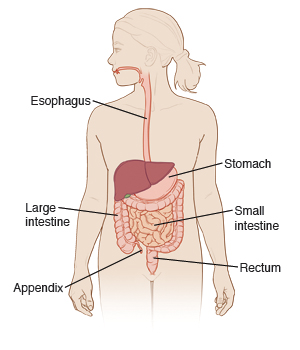Viral Gastroenteritis (Adult)

Gastroenteritis is often called the stomach flu. But it has nothing to do with influenza. It's most often caused by a virus that affects the stomach and intestinal tract.
Common viruses that cause gastroenteritis include norovirus, rotavirus, adenovirus, and astrovirus. Nonviral causes of gastroenteritis include bacteria, parasites, and toxins.
The danger from repeated vomiting or diarrhea is dehydration. This means that the body loses too much fluid. When this occurs, you must replace the body fluids.
Antibiotics aren't an effective treatment for this condition because it's caused by a virus.
Symptoms of viral gastroenteritis may include:
Home care
Gastroenteritis is spread by contact with the stool or vomit of an infected person. This can occur from person to person or from contact with a contaminated surface.
Follow these guidelines when caring for yourself at home:
-
If symptoms are bad, rest at home for the next 24 hours or until you are feeling better.
-
Wash your hands with soap and clean, running water or use alcohol-based sanitizer to prevent the spread of infection. Wash your hands after touching anyone who is sick.
-
Wash your hands or use alcohol-based sanitizer after using the toilet and before meals. Clean the toilet after each use.
Remember these tips when preparing food:
-
People with diarrhea should not prepare or serve food to others. If you prepare foods, wash your hands before and after.
-
Wash your hands after using cutting boards, countertops, knives, or utensils that have been in contact with raw food.
-
Dry your hands with a single-use disposable towel.
-
Keep uncooked meats away from cooked and ready-to-eat foods.
Medicine
Use acetaminophen or nonsteroidal anti-inflammatory drugs (NSAID), such as ibuprofen or naproxen, to control fever, unless another medicine was given. If you have chronic liver or kidney disease, talk with your health care provider before using these medicines. Also talk with your provider if you've had a stomach ulcer or gastrointestinal bleeding. Don't give aspirin to anyone under 19 years of age who is ill. It may result in a serious illness called Reye syndrome that may cause severe liver damage or even death. Don't use NSAIDs if you're already taking one for another condition (like arthritis) or are on aspirin (such as for heart disease or after a stroke).
If medicines for vomiting or diarrhea are prescribed, take them only as directed. Nausea and diarrhea medicines are generally okay unless you have bleeding, fever, or severe abdominal pain.
Diet
Follow these guidelines for food:
-
Water and liquids are important so you don't get dehydrated. Drink small amounts often or suck on ice chips as tolerated if you are vomiting.
-
If you eat, stay away from foods that are fatty, greasy, spicy, or fried.
-
Don't eat dairy if you have diarrhea. It can make diarrhea worse.
-
Stay away from tobacco, alcohol, and caffeine. These may make symptoms worse.
During the first 24 hours (the first full day), follow the diet below:
-
Beverages. Sip sports drinks, soft drinks without caffeine, ginger ale, mineral water (plain or flavored), or decaffeinated tea or coffee. If you are very dehydrated, sports drinks aren't a good choice. They have too much sugar and not enough electrolytes. In this case, use products called oral rehydration solutions. You can buy these at pharmacies and grocery stores.
-
Soups. Eat clear broth, consommé, and bouillon.
-
Desserts. Eat gelatin, ice pops, and fruit juice bars.
During the next 24 hours (the second day), you may add the following to the above:
-
Hot cereal, plain toast, bread, rolls, and crackers
-
Plain noodles, rice, mashed potatoes, chicken noodle or rice soup
-
Unsweetened canned fruit (but not pineapple), bananas
-
Limit fat intake to less than 15 grams a day. Do this by staying away from margarine, butter, oils, mayonnaise, sauces, gravies, fried foods, peanut butter, meat, poultry, and fish.
-
Limit fiber, and stay away from raw or cooked vegetables, fresh fruits (except bananas), and bran cereals.
-
Limit caffeine and chocolate. Don't use spices or seasonings other than salt.
-
Limit dairy products.
-
Stay away from alcohol.
During the next 24 hours:
-
Gradually resume a normal diet as you feel better and your symptoms improve.
-
If your symptoms start getting worse again, go back to clear liquids until you feel better.
Follow-up care
Follow up with your health care provider, or as advised. Call your provider if you don't get better within 24 hours or if diarrhea lasts more than a few days. It's also important to follow up if you can't keep down liquids, which can lead to becoming dehydrated. If a stool (diarrhea) sample was taken, call as directed for the results.
Call 911
Call 911 if you:
When to get medical advice
Contact your health care provider or get medical care right away if you have:
-
Abdominal pain that gets worse.
-
Continued vomiting (can't keep liquids down).
-
Frequent diarrhea (more than 5 times a day).
-
Blood in your vomit or stool (black or red color).
-
Dark urine, reduced urine output, or extreme thirst.
-
Weakness or dizziness.
-
Drowsiness.
-
A fever of 100.4°F (38°C) or higher, or as advised by your provider.
-
A new rash.